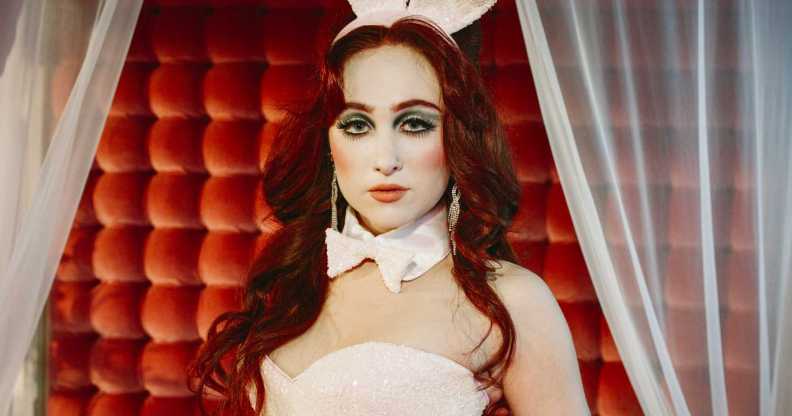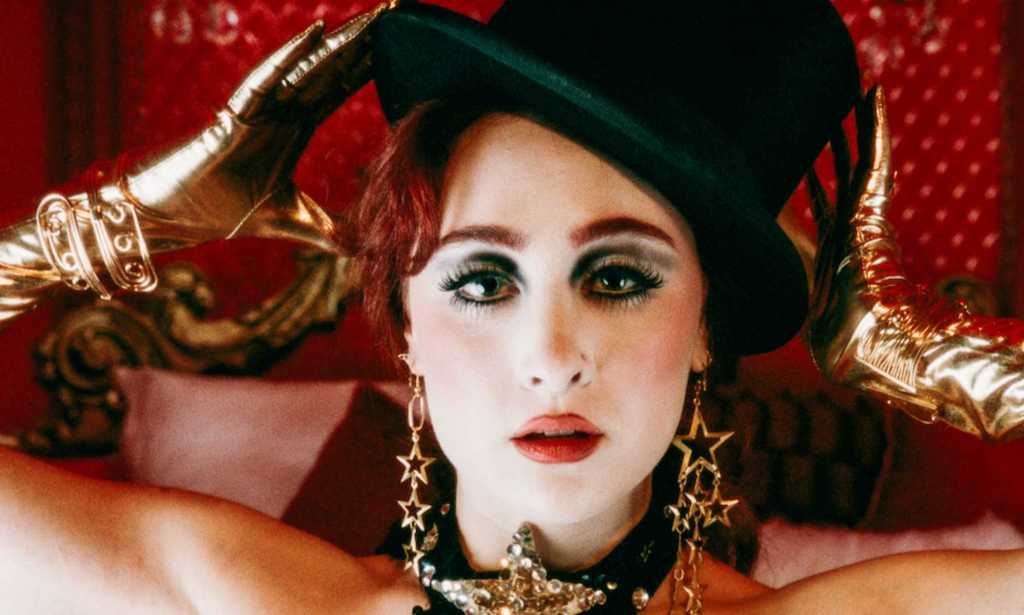Pop sensation Chappell Roan on ‘heart-breaking’ drag bans, queer pop ascension and Ariana Grande

Chappell Roan tells PinkNews about her religious upbringing, drag bans and why queer expression is so important. (Supplied)
When rising queer pop star Chappell Roan sits down to talk to PinkNews, it’s the morning after her first London show, and, although she’s “very pleased” and “very grateful” for the reaction at Islington’s live music venue The Garage, she admits she wasn’t without reservations about performing in the UK.
“London’s not the easiest crowd,” she says. “If they don’t like you … you know about it.”
So just how does the Missouri-born pop princess – real name Kayleigh Rose Amstutz – work the crowd to alleviate those fears?
“We had drag queens opening the show,” she says, as if it’s the most obvious answer in the world – and for her, it is.

“Drag is the funnest thing to watch,” she continues. “They don’t have to convince you that you need to watch them, so you’re already in the atmosphere of a party. I love having drag performers open because that energy gets everyone buzzed.”
That answer alone should give readers some idea of what’s important to Roan: not just queer visibility, but queer joy.
A trademark of every show – inspired, she says, by an Orville Peck gig in 2018 – is to have a local queen or two open the night. At The Garage, it was Crayola the Queen and Mahatma Khandi, both of whom did indeed work the crowd into a frenzy.
“I just remember thinking, I have to do this,” Roan says. “It’s so important to give back to the local queer communities [I visit].”
The idea isn’t without its difficulties, though. As the “Pink Pony Club” singer mentions, “in the States right now, we’re really struggling with drag bans, so I’m figuring out how to navigate that.”
She goes on to describe various “confusing” laws being passed across America to prohibit the freedom of expression as heart-breaking, but is not convinced that drag is the sole target.
“It’s an attack on trans people. It’s intentionally confusing – and people are p**sed [off].”
Because of Roan’s modus operandi of hiring local drag performers for each gig, the bans have had a tangible effect on her shows. The rising star recalls how a show in Nashville, Tennessee, happened to be on the same day that the state’s governor, Bill Lee, signed one of those bans into law, although it’s since been overturned.
For Roan, who is the “fullest expression of [her]self” when in drag, the stakes are personal.
“It’s very emotional. You can just feel the heaviness and sadness. It’s weird that everyone’s like: ‘Protect the kids, get the kids the f**k out’. I’m not worried, though. We will prevail, fight like hell. As always.”
For Roan, an out and proud queer woman whose songs include unabashed references to being “eaten out” by a female partner, or leaving a Midwest town to dance at a strip club, every track and every gig gives her an opportunity to do “her duty” and give back to the queer community.
“Otherwise, to me, what’s the point?” she asks. “This job is never paid well. I’ve worked for free for years, and it’s never been for the money.
“It’s just your duty as an artist to f**king do your part. Especially if you’re profiting off queer people, you best be giving back, they are loyal.”
She happily points to times she’s put her money where her mouth is: for example, a portion of the price of every ticket on a recent US tour was donated to a Black trans charity in New York.
It’s not just monetary value that Roan sees as important though. She considers herself a role model for countless other people who share experience of “very Christian” upbringings.
“As a kid, [I] thought being gay was a choice, now I’ve evolved, I see how important it is too actually create safe spaces the best I can… we need that. I need that.”
That evolution has been one hell of a ride. From signing a piece of paper in school, declaring “that [she] would remain abstinent until marriage,” to “saving yourself for your husband, or you’re impure,” everything in the singer’s early life directed her to push her queerness away.
Music, she discovered, was a method of expressing her feelings and finding a way out of that spiralling mind set – and she remembers the turning point.
“The pendulum just swung. I was like: ‘I have to talk about this’. Even though a lot of the songs are exaggerated, they’re not just stories, they’re like drag: the ultimate expression.”
Despite all that, Roan is “grateful for the past,” because [she] gets to measure how [she’s] grown.
“I’m still working through internal homophobia,” she adds. “When it’s ingrained in you, it’s in your blood. I’m still working it out.”
The picture of a Midwestern girl breaking free of her roots to have a gay old time is crystallised perfectly in Roan’s glittering “Pink Pony Club” – and the inspiration behind the song is as queer as one might hope.
Recalling her very first time in a gay club, she has a glint in her eye as she talks about the “spiritual experience” that led to the creation of her most-streamed song.
“It felt the same as when I felt the holy ghost in church. It was that same euphoric feeling. It was the opposite of what I was taught it would be.
“Everyone was smiling and so free, and I was obsessed with the go-go dancers, because I’d never seen one in person.
“I was like: ‘I have to do that. I have to go get it’. I wanted to dance, or strip, or experience some type of sexual expression. But I was too scared, so I wrote a song about me being a go-go dancer.”
Despite “Pink Pony Club” now being her most successful song in terms of streaming metrics and reactions at gigs, the track sat in a vault “for over a year”. When Roan first presented it to her then-label, Atlantic Records, with whom she split during the COVID-19 pandemic, they told her it didn’t make sense.
“I remember them calling me and being like: ‘You don’t even play guitar’. I was so f**king mad. I said: ‘Ariana Grande has a guitar solo in “Dangerous Woman” and she doesn’t touch a guitar’.
“It felt like a cop-out [from the label], and it was such a pivot from where I’d been in the past, musically. It was a hard song to grow into, because they made me feel stupid. I thought they were right for a while.”
Happily, they weren’t. Roan went independent when “a lot of artists got dropped in 2020,” before joining frequent collaborator Dan Nigro’s Island Records at the start of this year. From there, it has been non-stop queer joy and songs on which Roan was able to fully let loose.
When asked what she wants people feel at the end of a Chappell Roan gig, or song, she has an answer that exemplifies her ethos.
“I just hope they feel less alone in queerness. I hope they feel more at home.”
Chappell Roan is embarking on The Midwestern Princess Tour in September. Tickets are available now.
This article contains affiliate links, PinkNews may earn revenue if you click through and purchase products through the links.
How did this story make you feel?

